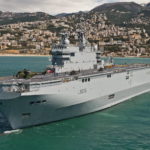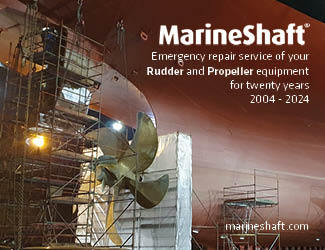In Paris, the European marine business show Euromaritime takes place for the second time. The HANSA talked with , President of the french marine industry association GICAN, about strenghts, challenges and the need for cooperation
The maritime industry around the globe is in difficult times. What is the strength of the French maritime industry[ds_preview]?
Patrick Boissier: The French naval industry, represented by the GICAN, is an industry of very high-added value. French businesses are among the world leaders for sophisticated naval construction, for defence and cruises. Our naval industry represents more than 40,000 direct jobs and 8.5 bill. € in production income. It has held a stable position for the last ten years, and plays a major economic role. The evolution of the French shipyard order-book has actually been very positive over the last 12 months, despite a difficult situation in the sector on a global scale. With major systems providers and a pool of numerous innovative SMEs, the French naval industry offer is both pertinent and competitive. It knows how to go about finding additional export markets and new markets, such as marine energies, for development, when certain other naval markets are stagnating or declining.
The Euromaritime exhibition held in Paris – Porte de Versailles puts the spotlight on this French and European industry. Launched in 2013 in collaboration with »le Marin« – the Ouest-France group and the GICAN, with the support of the French Maritime Cluster, Euromaritime is a European exhibition for the marine business and the strategic challenges it faces. It is a biennial event open to professionals in the maritime industry. Its objective is to present a comprehensive showcase of French and European maritime know-how, featuring the major trades that structure the industry, notably naval construction and repair, marine energies, offshore, ports, transport, fishing, safety, environment, services and maretics. Euromaritime is a »business« event, strongly focusing on BtoB meetings, and also serves to bring maritime economic issues to the attention of French and European political decision-makers.
What are the biggest problems of the French maritime industry?
Boissier: The French marine industry is constantly evolving. There is of course the general context of weak economic growth in Europe, restrictions weighing heavily on producers in the social or environmental sphere, which are of course perfectly legitimate, but responsibilities must be taken … There is also the issue of the complexity of administrative structures, which frequently hinders industrialists …
In a general manner, this industry faces competition from countries that do not have the same idea of the open market, support for industrialists and notably contend with the tenacity and speed with which the Chinese economy has become established since China entered the international market twenty years ago. It is therefore essential for the French maritime industry to reinforce its partnerships with Europe in order to take on an offensive approach in terms of maritime economy. We possess the know-how as well as the potential human and natural resources. Naval construction already exports more than 50% of its production; market shares are there to be had by French industrialists on the international scene.
What could be potential markets for the French maritime industry in the future?
Boissier: For our industry, it is always strategically important to continue developing into international markets and to diversify. For defence vessels, this diversification means new products, new offers in relation to life-cycle and equipment for State administrations for missions covering Customs, Maritime Affairs, Border Police, Civilian Security and the National Gendarmerie. In terms of vessel propulsion in general, French companies are well positioned for the shift to LNG propulsion (tying in with France’s historical role in the development of LNG tankers), but are also closely following hydrogen and wind propulsion. However, diversification in the French industry also implies the development of innovative products intended to accompany and carry »blue growth« in the area of Renewable Marine Energies and ocean exploration and recoverability. It can be noted that the report on the 2030 Innovation Commission presided by Anne Lauvergeon identifies recovering marine, mineral and other resources as one of France’s seven key ambitions. Indeed, all the evidence suggests that we are on the brink of a major »blue gold rush«.
The French shipbuilding sector has lost some of its power during the last year. Do you think, more European cooperation in this segment is necessary?
Boissier: Orders for vessels are cyclic. However, orders for cruise ships have been on the rise since 2011 in French shipyards and remain for strong for military vessels.
STX France SA has recorded several orders for cruise ships, taking their order book to a total of six very large cruise ships at the beginning of 2015. As for DCNS, it represents revenues of 3.36 bill. € for 2013, and almost 40% of revenues generated in international markets.
Other medium-sized shipyards are good examples of success stories. One example is CMN (Constructions Mécaniques de Normandie) who are building three patrol boats for Lebanon. This contract follows on from the one signed with Mozambique in 2013 for fishing boats and patrol boats.
Together, DCNS and Piriou have been awarded a contract for supplying three multi-mission ocean-going vessels (B2M) with an option for a fourth, and the associated maintenance services. In strategic terms this gives substance to the collaboration between DCNS and Piriou. Despite these »French success stories«, European cooperation in this domain is essential; we must join forces. All European Union policies have a common objective: promoting growth and employment with the framework of the Europe 2020 strategy, in response to the economic crisis and key EU challenges. This European strategy, signed in 2010, aims at »smart and sustainable« growth and sets objectives in terms of research and innovation, employment and climate change.
Do the French and European politics do enough to support the maritime industry?
Boissier: Public policies are essential for supporting innovation and growth. In France as in Europe, these policies are numerous and incentive-driven. These are undoubtedly never enough, but French and European maritime ambition exists and is taken to the highest level of State. For vessel financing, European countries play an essential role. It is fundamental to consolidate offers in order to remain competitive under international agreements.
In terms of support for innovation, there is the major European programme Horizon – 2020, with many calls pertaining to the sea, but there are also other programmes. For example, the European Commission is ready to authorise Regional State aid (AFR) in the naval sector, using a particular procedure.
In France, there have been calls concerning »vessel of the future« projects as part of the »future investments« programme, and also all the other more traditional sources of R&D financing, which are unfortunately spread too thinly.
The »Innovation 2030« programme established as a follow-on from the Lauvergeon report is also underway. Two ambitions directly concern the maritime sector: energy storage and recovery of marine resources (metals and seawater desalination). The GICAN strives to persuade the French population and its leaders that France possesses exceptional maritime assets and an innovative, high-performance and dynamic naval industry, at the service of a major economic and political agenda.
Michael Meyer



















